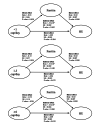Effect of Serum Ferritin on the Association Between Coffee Intake and Hyperuricemia Among American Women: The National Health and Nutrition Examination Survey
- PMID: 33859905
- PMCID: PMC8038869
- DOI: 10.7759/cureus.13855
Effect of Serum Ferritin on the Association Between Coffee Intake and Hyperuricemia Among American Women: The National Health and Nutrition Examination Survey
Abstract
Background Accruing evidence suggests an inverse relationship between coffee intake and serum uric acid. The mechanism(s) explaining this inverse relationship remains elusive. The aim of this study was to assess if the association between coffee intake and hyperuricemia is mediated via serum ferritin in women. Methods We pooled data from the 2003 to 2006 National Health and Nutrition Examination Survey (NHANES). We included women with complete information on all key variables. Coffee intake was classified as none, <1 cup/day, 1-3 cups/day, and ≥4 cups/day. Hyperuricemia was defined as serum uric acid >5.7 mg/dL. We assessed the association between coffee intake and hyperuricemia using logistic regression. Path analysis was used to examine whether serum ferritin mediated the effect of coffee on hyperuricemia. Results Among 2,139 women (mean age: 31.2 years [SD: 9.2]), mean serum uric acid was 4.4 mg/dL (SD: 1.0), and 227 (10.6%) had hyperuricemia. In multivariate logistic regression models, intake of ≥4 cups/day of coffee was associated with lower odds of hyperuricemia (OR 0.28 [95% CI: 0.09, 091], P=0.035). The total direct and indirect effect of coffee on hyperuricemia via serum ferritin was -0.16, P=0.009 and -8.1 × 10- 3, P=0.204, respectively. Conclusion Among women, moderate coffee consumption was inversely related to hyperuricemia by direct effect, rather than indirectly through the effects of serum ferritin. These findings suggest that serum ferritin does not mediate the inverse association between coffee and hyperuricemia in women.
Keywords: arthritis; crystal arthropathies; gout.
Copyright © 2021, Agoons et al.
Conflict of interest statement
The authors have declared that no competing interests exist.
Figures
References
-
- Coffee consumption and risk for type 2 diabetes mellitus. Salazar-Martinez E, Willett WC, Ascherio A, Manson JE, Leitzmann MF, Stampfer MJ, Hu FB. Ann Intern Med. 2004;140:1–8. - PubMed
-
- Lundsberg LS. Caffeine. Boca Raton: CRC Press; 1998. Caffeine consumption; pp. 199–224.
-
- Coffee, tea, and caffeine consumption and serum uric acid level: the third national health and nutrition examination survey. Choi HK, Curhan G. Arthritis Rheum. 2007;15:816–821. - PubMed
-
- Effects of coffee consumption on serum uric acid: systematic review and meta-analysis. Park KY, Kim HJ, Ahn HS, Kim SH, Park EJ, Yim SY, Jun JB. Semin Arthritis Rheum. 2016;45:580–586. - PubMed
LinkOut - more resources
Full Text Sources
Other Literature Sources

